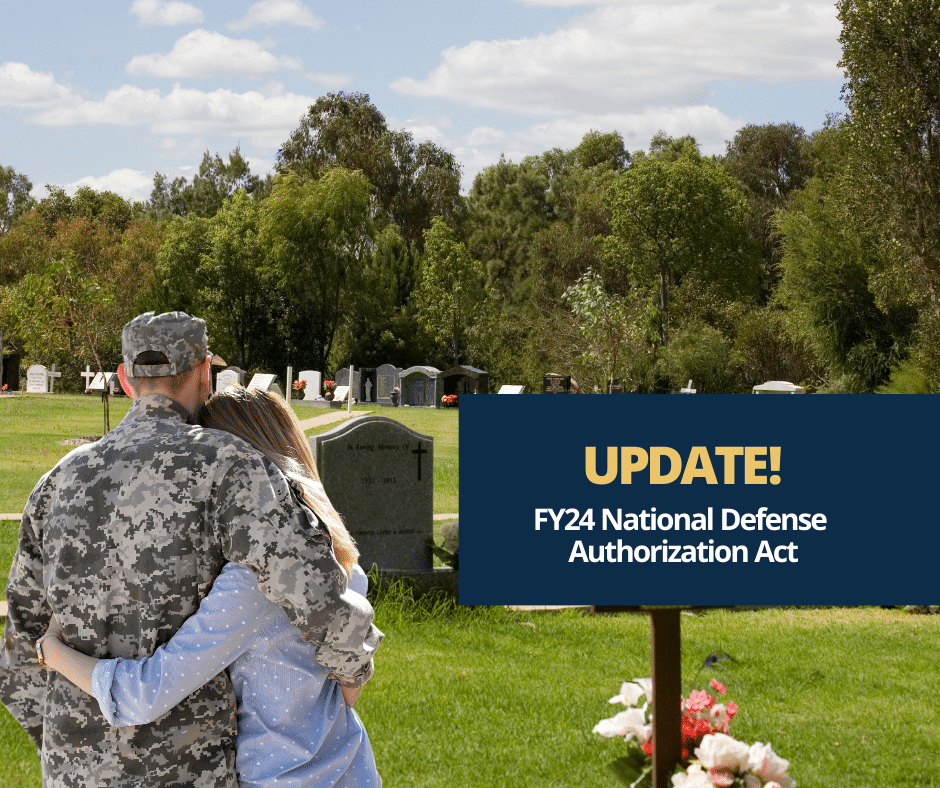Congress Recedes on Bereavement Leave in the FY24 National Defense Authorization Act
Over the last few weeks, many of you called your U.S. Senators seeking their support in allowing the U.S. Armed Forces to return home when their parents die. This bereavement leave would be an added provision to last year’s National Defense Authorization Act (NDAA) language that allows the U.S. Armed Forces to receive 14 days of paid bereavement leave for the death of a spouse or child.
The U.S. House of Representatives sought to expand bereavement leave for the deaths of servicemembers’ parents, but the U.S. Senate bill did not include the same provision.
To reconcile the differences between the House and Senate versions of the bills, Congress determined that U.S. Armed Forces members would qualify for leave under current leave options provided to servicemembers, and they issued the following statement:
The conferees note that the section 622 of the National Defense Authorization Act for Fiscal Year 2022 (Public Law 117- 81) created bereavement leave as a codified benefit for members of the Armed Services to ensure that no member could be denied paid time off following the death of a child or spouse. This benefit was a compromise borne out of a separate legislative proposal, section 622 of H.R. 4350, the National Defense Authorization Act for Fiscal Year 2022, as passed by the House of Representatives, that would have guaranteed paid leave time for parents who lose a child if the servicemember’s parental leave had already been approved but not yet fully used. But that proposal would not have provided any guaranteed paid leave for parents who had already used their parental leave, and it would not have provided any guaranteed leave for members following the death of a child after the child’s first year of life, as parental leave was required to be used within a year of the birth or adoption of such child. Section 622 would also not have provided any guaranteed time off for members upon the death of a spouse.
The conferees note that bereavement leave was never intended to create an entirely novel statutory entitlement to cover any loss that a servicemember might face, but rather to ensure that members who face the most difficult loss, the death of a child or spouse, could not be denied leave time to grieve such death. The annual leave policy under section 701 of title 10, United States Code, provides a generous benefit for members to take leave for personal reasons, including personal loss. Such statutory entitlement is bolstered by standing Department of Defense policies that provide for emergency leave, advance leave, compassionate reassignment, and many other policies supportive of servicemembers when in need.
Bereavement leave is one additional backstop to ensure that no member could be denied a period of paid time off from work following the death of a child or spouse. Because of this, bereavement leave was made non-chargeable if affected servicemembers had fewer than 30 days of leave so that none could be denied such leave on the grounds that they had already used their accumulated paid leave. The conferees expect that servicemembers who experience the loss of a close family member are afforded as much time off as possible, including via bereavement leave or emergency leave; alternate duties as required; and other accommodations as situationally appropriate.
Because of you, we had wonderful and supportive calls with both Democratic and Republican legislators, and as a result, Congress issued this thoughtful response.

